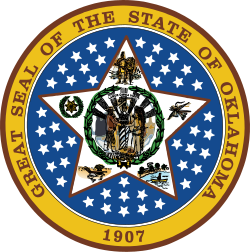| | |||||||||||||||||||||
November 4, 1958 | |||||||||||||||||||||
| |||||||||||||||||||||
 County results Edmondson: 40–50% 50–60% 60–70% 70–80% 80–90% >90% | |||||||||||||||||||||
| |||||||||||||||||||||
| Elections in Oklahoma |
|---|
 |
The 1958 Oklahoma gubernatorial election was held on November 4, 1958, and was a race for Governor of Oklahoma. Democrat J. Howard Edmondson defeated Republican Phil Ferguson and Independent D. A. 'Jelly' Bryce. [1]
Contents
Edmondson's landslide saw him win every county and achieve the highest share of the popular vote in any gubernatorial election in Oklahoma's history. This is one of two gubernatorial elections in Oklahoma in which the winner has carried every county. [a]


